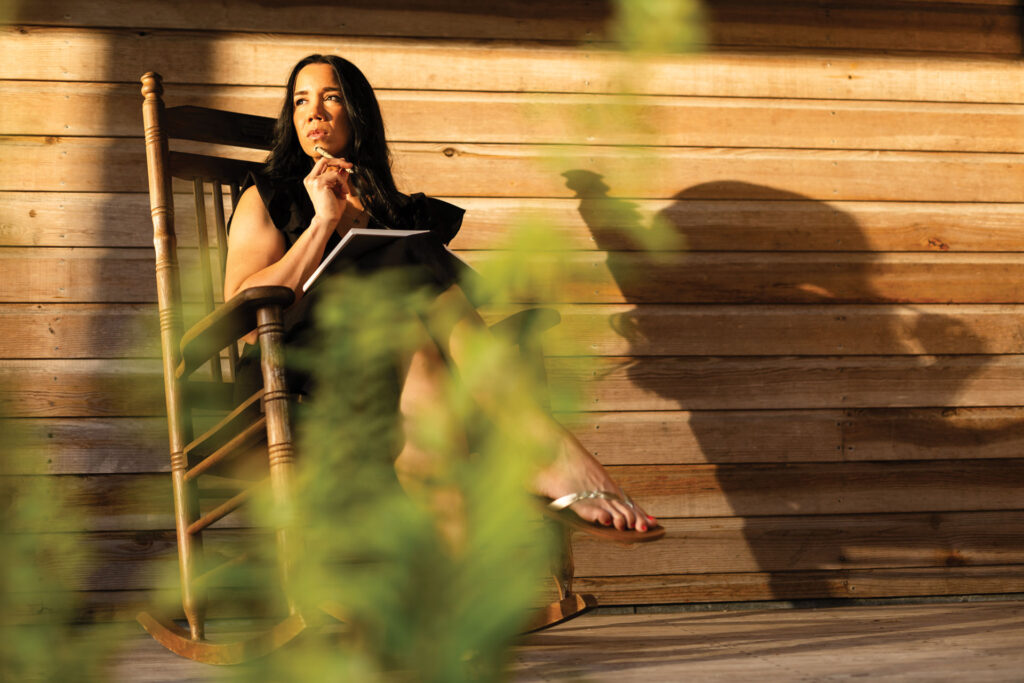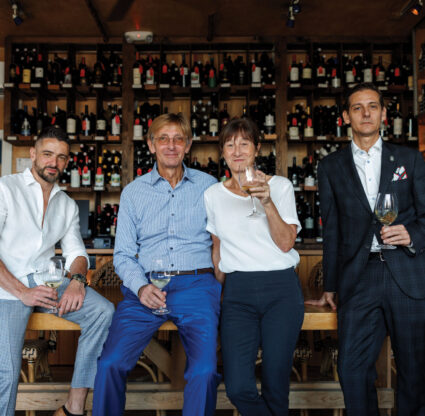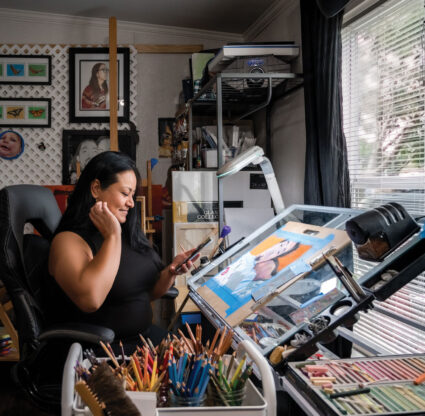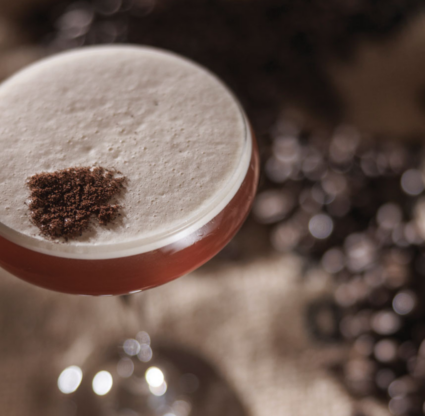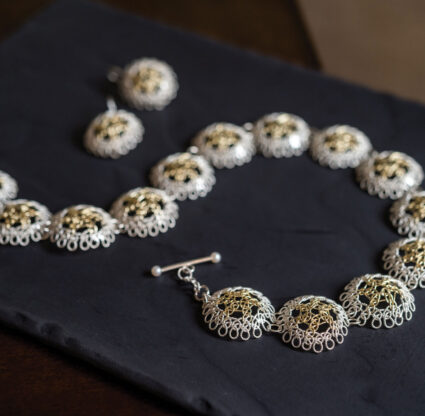On a hot, humid afternoon, the kind where green leaves melt into an embrace, Annabelle Tometich shows me where her mother’s mango tree stood before Hurricane Irma claimed it. Standing just off Fort Myers’ McGregor Boulevard, her mom’s home is a resilient Old Florida bungalow with a low roof and deep eaves. The mango tree, however, is a ghost, a divot in the ground hinting at the girth and age of a once-large tree, the one for which Annabelle’s first book, The Mango Tree: A Memoir of Fruit, Florida and Felony, is titled. The tree appears throughout the pages like an oil slick with an iridescent surface, reflecting the pooled memories of Annabelle’s youth—one branch then another—the shimmering image around which all others coalesce.
I’ve met Annabelle Tometich many times, as have you—most often, in the typeface of Lee County’s News-Press. For nearly 15 years, she wrote as the pseudonymous food critic Jean Le Boeuf, until 2021, when the seemingly white Frenchman revealed himself to be Annabelle: a half-Filipina Southwest Florida native. A self-described medical-school flunky-turned-line cook-turned-journalist, she shined a light on every dimly lit corner booth of our community— the strip mall melting pots, the gas stations-turned-fry houses, the simply delicious spot positioned precariously on the edge of an RV dealership.
Annabelle Tometich left the News-Press in 2023 to focus on her memoir, released this month. Many of the chapters are named for Southwest Florida locales, such as Pine Island, Cape Coral and McGregor, where her mother’s remaining mango trees form a tight cathedral over the classic home. Since Ian, the mango trees have borne no fruit, though the branches remember the weight, bending toward the earth like fingers folded in prayer. The manicured trees of Annabelle’s youth now grow wild as Annabelle’s mother, Josefina, grows older alongside them. “This woman grows fruit without even trying,” Annabelle says as she surveys the McGregor jungle, still rife with budding bananas, star fruit, avocado and lemon trees.
Josefina opens the porch door and enters the dense thicket of heat. “I told her you wanted to see her fruit trees, so she’s decided to join us,” Annabelle Tometich says, looking toward her mother, who stands much shorter than her (Annabelle inherited her height from her father—part Yugoslavian, part Canadian, part English), but is undeniably her kin. Both women’s eyes crinkle around the edges as broad smiles emerge—Josefina’s revealing deeper lines and fuller cheeks, her once jet-black hair now speckled gray. In the book, Annabelle recounts the even brush strokes her mother insisted upon, her inky hair set to shine, and the two fingers she placed around Annabelle’s nose, pinching its width, same as her own.
Annabelle notices one of the trees is heavy with russet brown pods. She opens her phone and turns toward her mother, typing, “What kind of tree is this?” Josefina has lost 90 percent of her hearing. They communicate via text and through the familiar mannerisms of a mother and daughter—the scrunch of a nose, the arch of a brow. “Tamarind,” Josefina replies.
Annabelle hikes one leg up to the first branch and leaps into the feathered foliage, grasping a fistful of pods. She holds one of the husks and presses with both thumbs until it cracks, removing the outer shell. The thin veins covering the pod’s fleshy inside shift just enough to reveal green fruit that turns light brownish red, then mahogany, then black as it ripens, growing from tart and tangy to sweet and sour.
This yard is etched into Annabelle’s bones, and the story of who she is cannot be severed from the lost mango tree. In 1988, Josefina, an immigrant from the Philippines, planted the tree’s seed, the umpteenth in a long line of mango seedlings, each carelessly mowed over by Annabelle’s father, Lou—until this one. “She only planted what would bear fruit,” Annabelle Tometich says. Josefina, a nurse, whip-smart and full of fire, railed against America’s attempts to flatten Filipino culture, to flatten her, yet struggled to value anything beyond the useful. When Lou died in 1989, the tree grew from seedling to sapling. In 1994, Josefina considered moving the family to the Philippines. The tree, now mature, bore fruit for the first time. The family stayed.
Josefina shipped boxes of mangoes to friends in California and New York and enjoyed them at home with her children over newsprint, the fruit’s juices running sticky and sweet. Years were tallied in mangoes until 2015, when Josefina caught a man trying to steal the sunset-skinned fruit. She grabbed her BB gun and aimed at his tires but shot out the back window of his truck instead. What happened next—what Annabelle Tometich and her siblings call “The Mango Missile Crisis”—bookends The Mango Tree, shaping the memoir as the tree shapes Annabelle’s understanding of her mother.
The BB gun was not considered a firearm but rather a ‘missile’ fired into an occupied vehicle. Josefina served five years probation, which could have been commuted had she shown remorse. She refused. “This very private story that for so long I never wanted to talk about will now be in print,” she says.
The memoir began as a collection of recipes and essays, some tongue in cheek, like “The Mango Shooter,” a cocktail riff on “The Mango Missile Crisis.” But a fellow writer and close friend advised her to go deeper. “After that, it came pouring out,” she says. “A lot of the book is me between the ages of 7 and 13. Certain moments just dominate your memory. Losing my father and then my grandmother. My uncle died. All within a three-year timespan.” Each loss, another ring on the mango tree, the visible fruits of invisible graces that distill a hard-fought life. Josefina built a family and a home, and Annabelle, now a mother, did the same, each reaching toward the sun.
I wonder aloud if the ways in which Annabelle has come to know her mother and herself have pushed her toward a radical empathy and allowed her to see the world around her as it is, simply and wholly. “I do think my life, the things I’ve experienced, has lent me certain tools, a way of seeing things,” she says.
As we head toward the driveway, we pass a patch of plumeria, not utilitarian at all. Josefina began planting the flowering trees in her later years. With their large leaves and bright summer blooms, they do best beneath the sun’s full grace—as did the little girl who once spread the skins of fruits around the base of the former mango tree as “an offering to the fruit-tree gods.” Those slips of light, deep yellow and red, would soon dissolve into the soil, only to return again, kissed by the sun.

